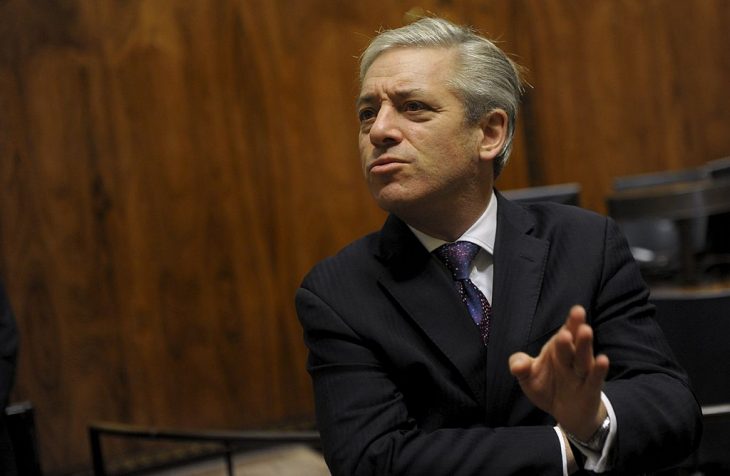John Bercow has taken a lot of flak for his comments about Donald Trump. The Speaker has been accused of being an embarrassment to Parliament for saying Trump wouldn’t be welcome to address MPs during a state visit. But amidst all the fury, Bercow’s pre-emptive ban does touch on a deeper question about the muddled thinking in British foreign policy.
Several autocrats, many with poor human rights records, have addressed both Houses of Parliament: Emperor Hailie Selassie of Ethopia in 1954, Nikolai Bulganin of the Soviet Union in 1956, and his successor Alexei Kosygn in 1967, have all done so. And during Bercow’s time as Speaker, the Emir of Kuwait and President Xi Jinping of China, have also spoken in Parliament. It goes without saying that every one of these leaders has a considerably worse record on civil and political rights than Donald Trump, even if the early days of Trump’s Presidency haven’t been encouraging.
‘Kuwait’s government aggressively cracks down on free speech, using provisions in the constitution, the national security law, and other legislation to stifle political dissent,’ says Human Rights Watch. Kuwait’s law, said Amnesty International, gave ‘women fewer rights than men in family matters, such as divorce, child custody and inheritance’. China is a one-party state, where even the country’s top judicial official attacked the idea of an independent judiciary. While between July and September 2015 – one month before Xi’s address to Parliament – China interrogated nearly 300 lawyers, as part of an effort to crack down on NGOs, activists, and the media.
This raises two key questions: firstly, is it more effective to bar an objectionable leader, or to skewer them with a smile? There is no evidence that Bercow sought to block the Kuwaiti and Chinese visits to Parliament. What’s more, when he welcomed Sheikh Sabah Al-Ahmad Al-Jaber Al-Sabah five years ago, Bercow went as far as praising Kuwait as a ‘nation of innovation’ and a ‘pioneer in the political representation of women’. But Bercow did insert some spiky language into his greeting:
‘Equality before the law, irrespective of race, gender, disability or orientation, is fundamental to our society here in the UK and we expect to be held to that standard. Naturally, we hope that that principle of equality will be practised and championed across the world.’
During Xi’s visit, Bercow was even more subversive. He praised the Indian prime minister as ‘representative of a great democracy,’ invoked democracy campaigner Aung San Suu Kyi and the ‘innate human right of freedom’ in his speech, and warned Xi that ‘the world will be watching’. The speech was a triumph in passive-aggressive concision, while allowing the government to pursue its controversial engagement without serious upheaval. Would this have been a preferable approach in the case of Trump? A few pointed references to multiculturalism, diversity, and respect for judges would surely get the message across.
Secondly, is it right to judge established autocrats differently to apparently wayward democrats? Trump’s presidency, scarcely two weeks old, is certainly going backwards. Trump has apparently insulted at least one of the country’s closest allies, tweeted like Colonel Gaddafi, and launched an unprecedented attack on the judiciary, labelling the federal judge who blocked Trump’s visa ban a ‘so-called judge‘. But for his faults, Trump is not locking up lawyers, censoring the internet, or jailing protesters and these are meaningful differences. Our legitimate concern about authoritarian tendencies must be distinguished from actual repression, and here there is simply no comparison. Is it right, then, to welcome Xi, but exclude Trump?
On the other hand, America is different. It holds itself to higher standards. ‘We do not seek to impose our way of life on anyone,’ declared Trump in his inaugural speech. But he did ask that it ‘shine as an example for everyone to follow’. Britain also has an interest in upholding the ideas of non-discrimination, religious tolerance, and the rule of law. When democracies flout these principles, the breach seems more shocking and concerning than when a Communist dictatorship does so. This is why there is then a need for greater effort to reassert the principles which are at stake. It may be argued that repeating principles makes no difference to Trump’s behaviour. Perhaps. But for the cooler heads around Trump, such as Defence Secretary James Mattis, Secretary of State Rex Tillerson, and Vice-President Mike Pence, seeing the impact of the president’s words and actions on international perceptions of the United States has an effect.
Yes, the Speaker is wrong to try and play a key role in foreign policy. But the Government has already taken a calculated risk in engaging the president more rapidly and enthusiastically than any other ally, even as he attacks his own judiciary, as well as allies like Australia. It’s true that many with more sullied records have addressed Parliament in the past. Timing and context, though, are important. Trump is not a normal president, and his trip will not be a normal state visit. The Government should tread carefully when it comes to engaging with Trump.






Comments